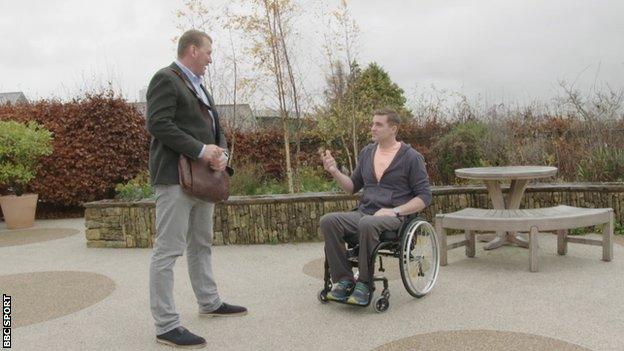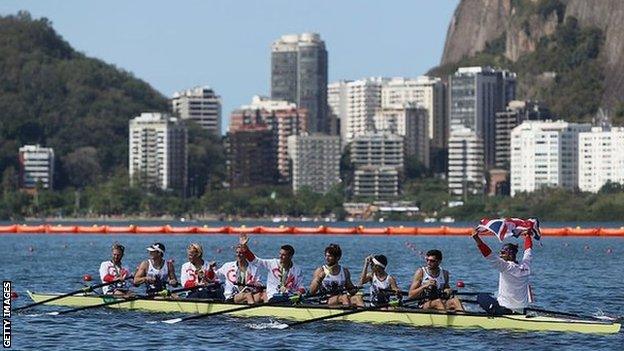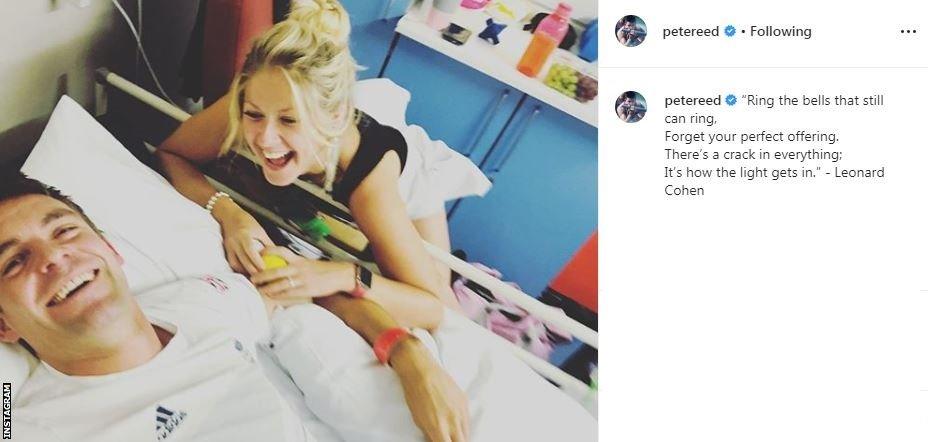Pete Reed: Three-time Olympic rowing champion on spinal stroke, paralysis and the future
- Published

Sir Matthew Pinsent and BBC Sport visited Pete Reed at Salisbury NHS Foundation Trust
"It was scary. I was lying down and I could feel the life draining out of my legs."
On 3 September Pete Reed walked into his local hospital, an imposing figure at 6ft 6in in his Royal Navy uniform. He had a pain in his chest, numb legs and was unable to pee.
A small spinal stroke, the doctors said. Three days later, he was walking around the hospital when the pain returned, only this time it was much more severe. "Like nothing I've felt," he says.
He returned to bed as the "extraordinary" pain radiated across his chest and his back.
"Jeannie [his partner] was holding my feet because I asked her, because I was wiggling my feet up and down, and then slowly they came to a stop," the 38-year-old tells BBC Sport.
"I could slowly feel it coming up through the legs and up to my chest. Within about 45 minutes the pain had gone and I couldn't move."
Reed, a three-time Olympic rowing champion, had suffered a much bigger spinal stroke. He is now paralysed from the chest down.
In his first interview since the injury, he tells Sir Matthew Pinsent how his life has changed in the near three months since.
'Walking again would be a miracle' - a new reality
"Once the pain had died away, the first thing I tried to do was sit up," he recalls. "I grabbed the sides of the bed to pull myself up and I fell forwards like a rag doll, and then fell backwards. That's really scary."
Just three days earlier, Reed had been completing an assault course as part of his training for the Royal Marines. Ranked Lieutenant Commander, he had returned to a full-time naval career after retiring from rowing in April 2018.
He was doing well. After all, this is a man who is reported to have the world's largest recorded lung capacity and, by his own admission, was a "physical specimen".
Now, the only movement he has below the chest is the ability to wiggle a big toe. During his time in hospital, he contracted a rare form of meningitis as well as bladder infection after bladder infection.
The cause of his injury is unknown and its extent will become apparent once the inflammation due to the trauma reduces. He may gain some movement in his legs, but walking again would be a "miracle".
"If the damage is done, I won't be walking again. I can try all I like but it might not happen," he says. "That's quite hard to take, but I'll take any movement I can get.
"It's a balance of being positive and realistic, so I'll make sure I keep my emotions in check."
After two months in an NHS hospital, Reed moved to the spinal treatment centre at Salisbury NHS Foundation Trust three weeks ago. When he is discharged, he will go to the military rehabilitation centre at Stanford Hall near Loughborough.
"People will see someone who has been through the Olympics very able-bodied, and now they'll see the wheelchair, but there's more to it than that," he says.
"The grim realities are bladder care, bowel care, digestion and skin care and how it all affects you.
"In the days after that big stroke, I would be awake at five in the morning thinking 'how am I going to go to the bathroom?'. That's hard."
'After London 2012, who would think I'd face a bigger challenge?'

Reed (waving, centre) won men's eight gold at Rio 2016, having won men's four gold at Beijing 2008 and London 2012. He is also a five-time world champion
For many years as a rower, Reed's daily life was planned to the minute. A 20km row on the machine in the morning, a couple of hours out on the water and then more time in the gym.
It's still much the same. On his phone he has a colour-coordinated timetable, full of meetings with consultants, physiotherapy sessions and educational sessions, in which he learns about his body's new needs. Green is for visitors - and there is a lot of green.
Many of his old crewmates - Andrew Triggs Hodge, Alex Gregory, Stan Louloudis to name but a few - and his former coach Jurgen Grobler have been to visit. It was the latter, GB's mastermind of a head coach, who Reed thinks struggled the most.
"Nobody knows my body better than Jurgen," he says. "He saw me at my physical best so for him arriving to see me in a wheelchair was tough.
"He was the one person who I would try to impress physically, and it's a different world now."
A different world, maybe, but as Reed says, he couldn't have had better preparation for his new life.
"There's nothing more beneficial to me now than my athlete mindset. Nothing."
Reed has lived his life in four-year chunks, Olympiad after Olympiad, winning gold at every Games since Beijing 2008. In this new, very different chapter of his life, he's treating it much the same.
"Where we were going before was a gold medal, we knew what the goal was, we knew the venue, the start time, the standard - typically a second or two faster than the world record," he says.
"Now, the standard is walking again. Let's say a gold medal is walking again, mountaineering, back to my old life and working for the Navy.
"It's so familiar it's untrue. I count my blessings that I'm up for that challenge.
"If the aim is walking again rather than a gold medal, the target is even bigger than before and the motivation is even bigger than before, and I didn't think I'd ever say that again.
"After London 2012, who thought that I'd have a bigger challenge and more motivation to achieve?"
New boundaries and Paralympic fantasies

Reed says he and his "incredible" partner Jeannie have had some "very frank" conversations, and they make a "great team"
Reed doesn't know what his future holds. He hopes he will be able to return to the Navy in some capacity, while he also wants to use his voice and his platform to raise awareness of the difficulties disabled people face.
A lot of adjustment, both physical and mental, will take place. He will never return to his first-floor London flat, and he also has to get used to looking up at people, rather than down from his previous towering physique.
"I pride myself on being brave and bold and sometimes a bit reckless," he says. "Now, when I go out into the city, a pavement is suddenly an obstacle. Can I get up? Can I get down that, or a set of stairs? At the moment, it's a no-go.
"I will learn to tackle these things, I will learn to get as close to my old life.
"It will take a lot of time, because a kerb is a boundary. I need to get to a point where there are no boundaries."
Yet could the future also see a return to sport? Could this Olympian one day compete at the Paralympics?
"I won't lie, I've thought about it and I thought about it quite quickly. I even started looking up all the Paralympic sports and classifications," he says.
"But we've got to give the Paralympians credit. While I would fantasise about that, those athletes are incredible."
But which sport? Rowing is out because of his lack of core control and back strength, but javelin, archery or shooting? Maybe.
"Invictus Games, why not?" he says. "At the moment the Paralympics feel like fantasy land. I've got three Olympic medals and I didn't think I'd ever have those, so why not?
"There are lots of things to do in life, but imagine representing ParalympicsGB. That would be cool."
You can hear the full interview on The Inside Track on 28 November at 19:00 GMT on BBC Radio 5 Live.